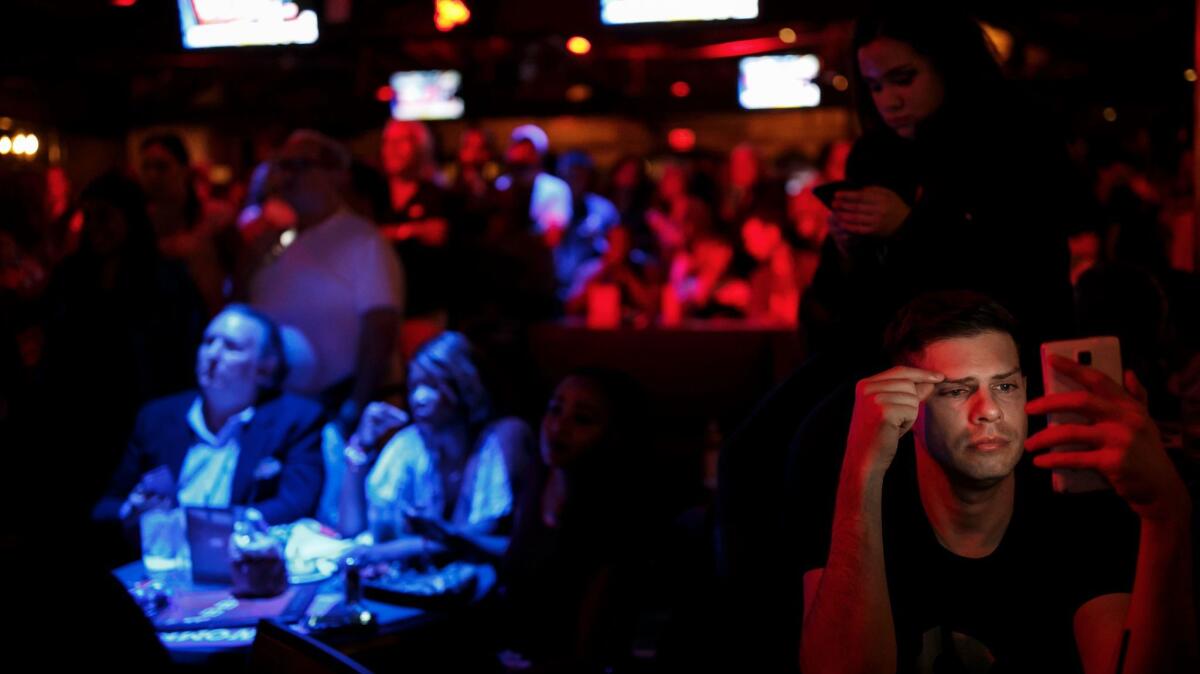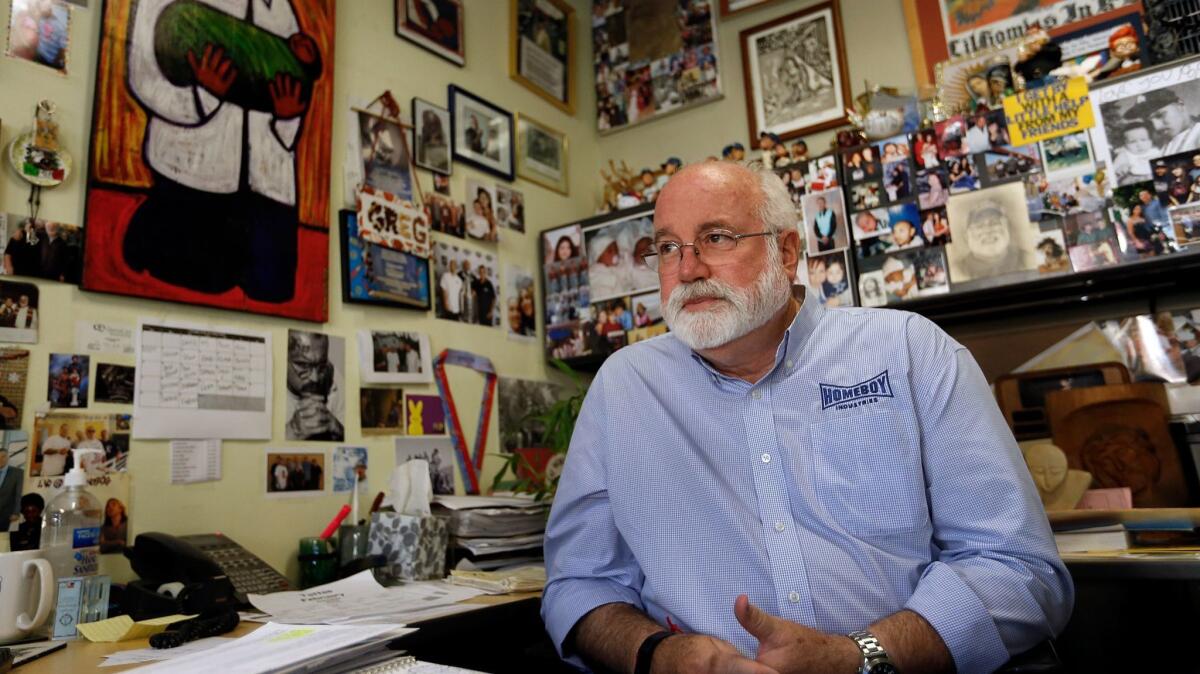No joke: A priest, a rabbi and a social scientist consider the election’s emotional fallout

This week, the president-elect was supposed to settle down, put aside his narcissistic bluster and start bringing together a deeply divided country.
Instead, we all learned a new vocabulary word: emoluments.
Here in blue, blue California — and how emotionally appropriate is that color right now? — resistance to the nascent Donald Trump presidency has begun to take shape.
In Los Angeles, the mayor and police chief have said they will refuse to toughen up policies about immigration enforcement despite Trump’s threats to cut federal funding to so-called sanctuary cities.
Chief Charlie Beck, bless him, didn’t even wait a week before pushing back. “We are not going to work in conjunction with Homeland Security on deportation efforts,” he said. “That is not our job, nor will I make it our job.”
In San Francisco, the Board of Supervisors passed a spectacularly in-your-face resolution, announcing that it would remain a sanctuary city that respects not just immigrants but women, LGBTQ people and those of all faiths. It further resolved that “black lives matter in San Francisco, even if they may not in the White House.”
Around the state, there is talk of secession. We’re the world’s sixth-largest economy. We’ve got the innovation, the industry, the tourism. (And the cannabis!) So why not break away? People have been suggesting it for years.
In normal times, you could laugh. But Brexit happened. Then Trump happened. Nothing is normal anymore.
Who could help me put this into perspective? I called a rabbi, a priest and a social scientist.
The rabbi told me to buck up. The priest counseled tenderness. The social scientist said, with regret, that it’s a good time to be a white male.
I probably should have stopped at the priest.
::
The moment he realized Trump had won, said Rabbi Steven Jacobs, “I went back to my deep religious roots. I said: ‘Oh my God.’ ”
Jacobs, 77, is a veteran civil rights activist whose mentors included the Rev. Jesse Jackson. He was the founding rabbi of Temple Kol Tikvah in Woodland Hills. Now retired, he lives in Alameda with Democratic State Controller Betty Yee, whom he married in December.
When I reached him by phone in Sacramento, he was less disturbed than I expected by last weekend’s neo-Nazi gathering in Washington, D.C. — where members of the National Policy Institute raised their arms and chanted, “Hail Trump.” A widely circulated video showed the group’s founder, Richard Spencer, extolling America as “until this past generation, a white country, designed for ourselves and our posterity.”
“Richard Spencer just plays into what I have felt for a long time,” Jacobs said. “When Donald Trump was talking about making America great again, he was talking about making America white again. I believe that to my very core.”
On the other hand, Jacobs said, “You gotta say, OK, get over it. Betty and I have been to several events in the past week, and people are talking about anger and stages of grief. This was an election. You didn’t lose a parent or a child, and you’ve got a job to do. If we are going to let Trump get us depressed, then he still has control of us. If he has control of us, and we continue to mourn and be angry, it will just leave us bitter. There is goodness every day.”
::

I had some trouble reaching Father Greg Boyle, the Jesuit priest who is founder and director of Homeboy Industries. His voicemail was full. “It’s my own damn fault for giving my phone number to every gang member in L.A. County,” he joked when we finally connected.
The day after the election, while he was in the hospital receiving treatment for his longtime battle with leukemia, his phone blew up with text messages from many of the former gang members he works with. Some of the concerns were outlandish: “Will Donald Trump close us down immediately?”
But, he said, “the tenor of the fear and anxiety were real.”
“I have voted for presidents for 44 years,” Boyle said. “Half have lost and half have won. But that’s not what this is. This is not about being disappointed that your candidate lost. It’s the normalizing of things you spend your life fighting against — exclusion, racism and meanness.”
Despite this shocking turn, he sounded hopeful.
“This is a moment to cherish the loss, actually, because then you know to what you ought to give your heart all over again,” Boyle said. “That’s what I tell folks here. We talk about the power of tenderness to ventilate our world. That is our defense, our defiance, our resistance, to safeguard against normalizing bigotry and exclusion.”
::
I’m not embarrassed to admit this: The other day, I Googled, “How to get over election disappointment.”
I found an article with a link to an academic paper called “Losing Hurts: The Happiness Impact of Partisan Electoral Loss.”
It was an analysis of the 2012 presidential campaign, published in the Journal of Experimental Political Science.
Three researchers discovered that the pain of losing an election lasts longer than the joy of winning — but that, just like when a favorite team loses, most people bounce back in a week.
That does not appear to be true in 2016, said the paper’s lead author, Lamar Pierce, associate professor of strategy at the Olin School of Business at Washington University in St. Louis.
He has not yet analyzed all the data from a daily poll he uses, but he already sees a “tremendous difference” in how voters who opposed Trump are handling the aftermath versus voters who opposed Barack Obama in 2012.
“Republicans talked about Obama being the anti-Christ, but a week later, nobody cared,” Pierce said.
But for the plurality of American voters who supported Hillary Clinton, he said, “the response is not sadness or disappointment. It’s a forward-looking anxiety about what comes next, and for very valid reasons. The thing I keep coming back to as a straight white male: I am angry and disappointed, but I am kind of sadly OK with it [the election] in a way that bothers me. I don’t feel a personal threat to myself in the way many, many people do.”
In the coming months, Pierce said, social scientists probably will try to gauge the effect of Trump’s victory on “the normalization” of bad behavior.
“They’ll be interested to study whether in three or four months, grabbing people’s genitals or calling them the N-word or making fun of disabled people becomes socially acceptable in public.”
He added, “You will see less of that in California than you will in Missouri.”
Well, that’s a relief. I think.
Twitter: @AbcarianLAT
More to Read
Get the L.A. Times Politics newsletter
Deeply reported insights into legislation, politics and policy from Sacramento, Washington and beyond. In your inbox three times per week.
You may occasionally receive promotional content from the Los Angeles Times.











